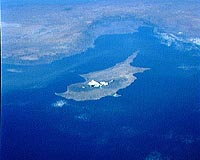| . |  |
. |
Beirut, Lebanon (UPI) Jul 14, 2009 Almost every day, Israeli warplanes penetrate Lebanese air space, mostly flying reconnaissance missions to plot Hezbollah's military expansion. For the Lebanese, these are a constant provocation that violates U.N. Security Council Resolution 1701, which ended a 34-day war between Hezbollah and Israel in July and August 2006. With the third anniversary of that start of what the Israelis call the Second Lebanon War -- the first began in June 1982 when Israeli forces invaded Lebanon to crush the Palestine Liberation Organization and never really ended -- tensions are once again palpable as the leaders of both sides talk tough. The assumption on both sides is that 2006 was unfinished business and that another round is inevitable. Hezbollah and Israel's military have both been getting ready for it. On July 8 Michael Williams, the U.N. special coordinator for Lebanon, rebuked Israel for the constant overflights and warned that they threaten what U.N. Secretary-General Ban Ki-moon called the "fragile cease-fire" between the two countries. Ban chaired a meeting of the Security Council in New York one day after a U.N. report found that hostilities could resume at any time because of unresolved issues linked to Resolution 1701, most notably Israel's ire at the lack of efforts to halt arms supplies to Hezbollah from Iran and Syria. However, tension has also been heightened by the roundup of some 40 suspected Israeli spies in Lebanon, including a former intelligence general and three serving army colonels, in recent months, the region's biggest espionage scandal in decades. "If these allegations are confirmed," Williams cautioned, "that would constitute a very serious violation of Lebanese sovereignty and undermine security." The large-scale Israeli espionage operation is widely seen by the Lebanese as the precursor of a new Israeli offensive. Earlier this month Israel's new prime minister, the right-wing hawk Binyamin Netanyahu, warned that his government would hold all of Lebanon responsible for any Hezbollah aggression. He vowed that if hostilities resumed, Israel would wage an all-out war to the finish against Lebanon, and not one focused primarily on Hezbollah and its allies as was the case in 2006. Hezbollah triggered that conflict by launching a cross-border raid in which eight Israeli soldiers were killed and two captured. Hezbollah's charismatic leader, Hassan Nasrallah, acknowledged after the war that had he known Israel would unleash a major offensive, including non-stop airstrikes, he would not have ordered the border operation. Still, Hezbollah, heavily outnumbered, fought the Israelis to a standstill in south Lebanon and rained some 4,000 rockets on Haifa and other Israeli cities in a non-stop bombardment from the first day of war. Nasrallah proclaimed it a "divine victory" for Hezbollah. Israel, its once-vaunted forces degraded by years of waging a low-intensity campaign against the Palestinians, failed to achieve its declared objectives of freeing the captured soldiers, halting Hezbollah's rockets and crushing it as a military force. A postwar government commission of inquiry was scathingly critical of the dismal mismanagement of the war by Israel's military and political leadership. In recent months the Israelis have come to believe that, given the general calm on the Lebanese border over the last three years and the deployment of the Lebanese army in the south for the first time, the war was not a total failure. In the meantime, the military has restructured and honed its forces to ensure the blunders of 2006 are not repeated. For its part, Hezbollah is reputed to have amassed some 40,000 Iranian and Syrian missiles -- more than three times what it had in 2006 -- and has constructed defense lines and a whole military infrastructure that now encompasses much of Lebanon. Despite the fiery anti-Israeli rhetoric of Hezbollah leaders, some Lebanese commentators do not believe the region is on the cusp of a new war, in part because of the turbulence in Iran. "It would be very provocative if Israel did something now," said Paul Salem of the Carnegie Middle East Institute in Beirut, because international opinion would not tolerate it. "But that could change in the next two or three years," particularly if U.S. efforts to curtail Iran's nuclear program do not succeed. Share This Article With Planet Earth
Related Links
 Greek Cypriots say reunification deal unlikely in 2009
Greek Cypriots say reunification deal unlikely in 2009Nicosia (AFP) July 14, 2009 The Cyprus government said on Tuesday that a reunification deal to end decades of division on the island is not on the cards in 2009, as hoped for by the international community. "As things stand now, with the positions tabled by the Turkish side, and nothing changes, we don't see how it's possible for a settlement to be agreed on and put to a referendum by December," government spokesman St ... read more |
|
| The content herein, unless otherwise known to be public domain, are Copyright 1995-2009 - SpaceDaily. AFP and UPI Wire Stories are copyright Agence France-Presse and United Press International. ESA Portal Reports are copyright European Space Agency. All NASA sourced material is public domain. Additional copyrights may apply in whole or part to other bona fide parties. Advertising does not imply endorsement,agreement or approval of any opinions, statements or information provided by SpaceDaily on any Web page published or hosted by SpaceDaily. Privacy Statement |